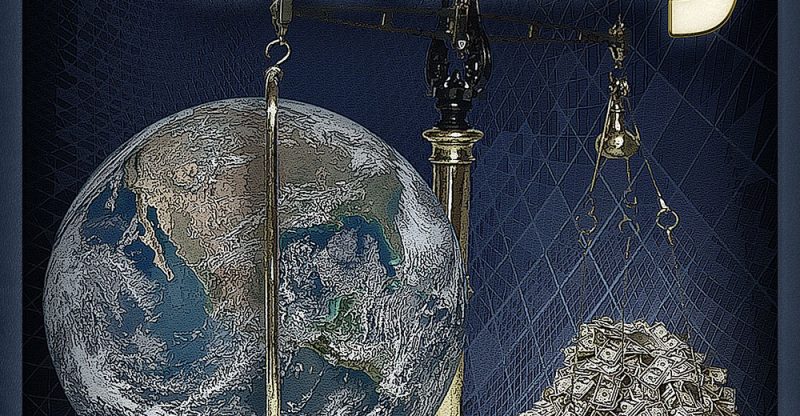Counting Bounty: The Quest to Know the Worth of the Earth
The Pandemic Preface
Most of us – that is, nearly all of us – consider a virus like covid-19 strong. At the other end of spectrum – the weak end – hides economic justice. But think again.
- Just how weak would be an absence of poverty? Some of the hardest hit demographics are poor people.
- How weak would be an absence of pollution? Contaminants both mutate genes and enfeeble immune systems; viruses love that.
- How weak would be stress-free, multi-generational families? The hardest hit group are the elderly warehoused alone in expensive facilities.
- How weak is a healthy diet, something your tax dollars do not support unlike a diet of packaged goods high in salt and sugar which your elected representatives do subsidize?
- How weak is a functional community in which neighbors not only know but identify with and support one another, as in amazing Roseto Pennsylvania (Chapter 41)? Healthier societies enjoy smaller, human-scale wealth gaps, and the worth of Earth can be used to close that gap, as does the oil dividend in Alaska (Chapter 40).
Justice can be powerful, but it’s not on the agenda. Instead, “our” elected representatives are dishing out trillions to deep-pocket insiders. That’s people who not only don’t need it but who could afford to lose hundreds of thousands – what they might spend on a birthday party – and not even notice it. Most of the rest of us bide our tongues, getting a few bucks of hush money deposited into our accounts.
Even if the informal moratorium on mortgage payments may in some places become official, banks are not hurting, not after the latest favors, plus the huge profits garnered in recent years while ordinary people caught nary a drop trickling down.
Local governments and school districts – to the extent they rely on local site values – might have to devalue land and make do with less revenue. Later, as the ultra-endowed spend their swollen wealth, it’ll trickle down and re-inflate land values. Meanwhile, however, many feel the squeeze.
If, as the Chinese say, crisis is danger plus opportunity, then let’s take the Chicago mayor’s advice and “never waste a good crisis.” Those always first in line already have. We have some catching up to do.
Drastic is the new normal. Stay indoors. Stay apart. Don’t go to work. Spend multi-trillions like there’s no tomorrow – favors for all and everyone invited to the party. This stimulus is money our governments don’t have but must borrow. Politicians are digging deeper the debt crater for future taxpayers.
In this unhinged new world order, a critical mass could actually take seriously fundamental reform. That’d be the sort of revenue policies that’d not only mitigate any crisis. They’d also work to everyone’s benefit during stable times.
First, rather than replace lost revenue, have governments reduce their waste. Harvard U puts government waste in the trillions, a huge percentage of their budgets (Ch 41), in the ballpark with the current round of handouts. Consider slashing these big-budget items:
- Usually, when localities cut costs, they cut low-paid jobs and leave the high-paid sinecures in place with nothing to do. This time, cut both.
- Legalize victim-less crime and cut police budgets. If you want to fund anything, fund what addicts themselves say they need, which costs much less.
- Along those lines, let kids determine curriculum and sell-off or re-purpose empty school buildings.
- Repeal red tape and the bureaucrats that go with it. Instead, reform limited liability and tort law. Let imposing risk – as by sending one’s pollution downwind or downstream – become business for insurance companies. They know what standards to require of customers.
These four reforms would tremendously streamline the state. You can probably think of more good ideas. Now turn to funding the remaining budget.
During slowdowns, governments collect far fewer taxes on sales and income. Since those taxes are now close to useless and always counterproductive (Ch 41), this is a good time to get rid of those drags on any economy, especially a hobbled one, altogether.
Replace them with charging full annual market value for government-granted privileges, like corporate charters, utility franchises, land titles, patents and copyrights, etc. If we charge their market value and no more, then the privilege holder will always be able to pay. Right now, with values down, fees would be low. Later, they’d rise, as the economy would revive.
If you’re pro-economic growth, read up on your economic history. What did San Francisco after its earthquake and fire a century ago and the Asian Tigers prior to their ascendancy have in common? They put into practice—to a degree – these tax shifts. Basically, they exempted improvements and levied locations. It worked then, it worked in New York City after World War I, and it would work now.
It’d work so well our steward – the state – would have a surplus (Ch 40). Seriously. Land values would be sky high, waste would be axed. Repeal welfare – corporate and ordinary – and its bureaucracy. Instead, pay citizens a dividend.
Further, any “plandemic” becomes farther fetched. Sure, power corrupts and most people can’t believe the worst of the powerful (since we can’t know for sure, I pass on passing judgment). Yet once we redirect revenue to everyone, we deprive the black-budget boys. They’d have to hold a bake sale to finance any shenanigan.
Turn from this sound yet unsolicited advice to the intellectual quest at hand. This slowdown, like all economic downturns, may lower the values of locations and resources. The final estimate we reached may no longer be current (Ch 38). But it will be on the nose again, and soon. Market economies are nothing if not cyclical. Don’t hold your breath but don’t worry, either. Our method was sound so our total will be found in the near future. And that Citizens Dividend? It’ll be fatter than you can imagine in your wildest dreams (Ch 41).
Now, let us examine that geonomic method.
…
From upcoming the book: Counting Bounty: The Quest to Know the Worth of the Earth> available July 2020.
Available at TrineDay, Amazon, Barnes & Noble, Books-a-Million









